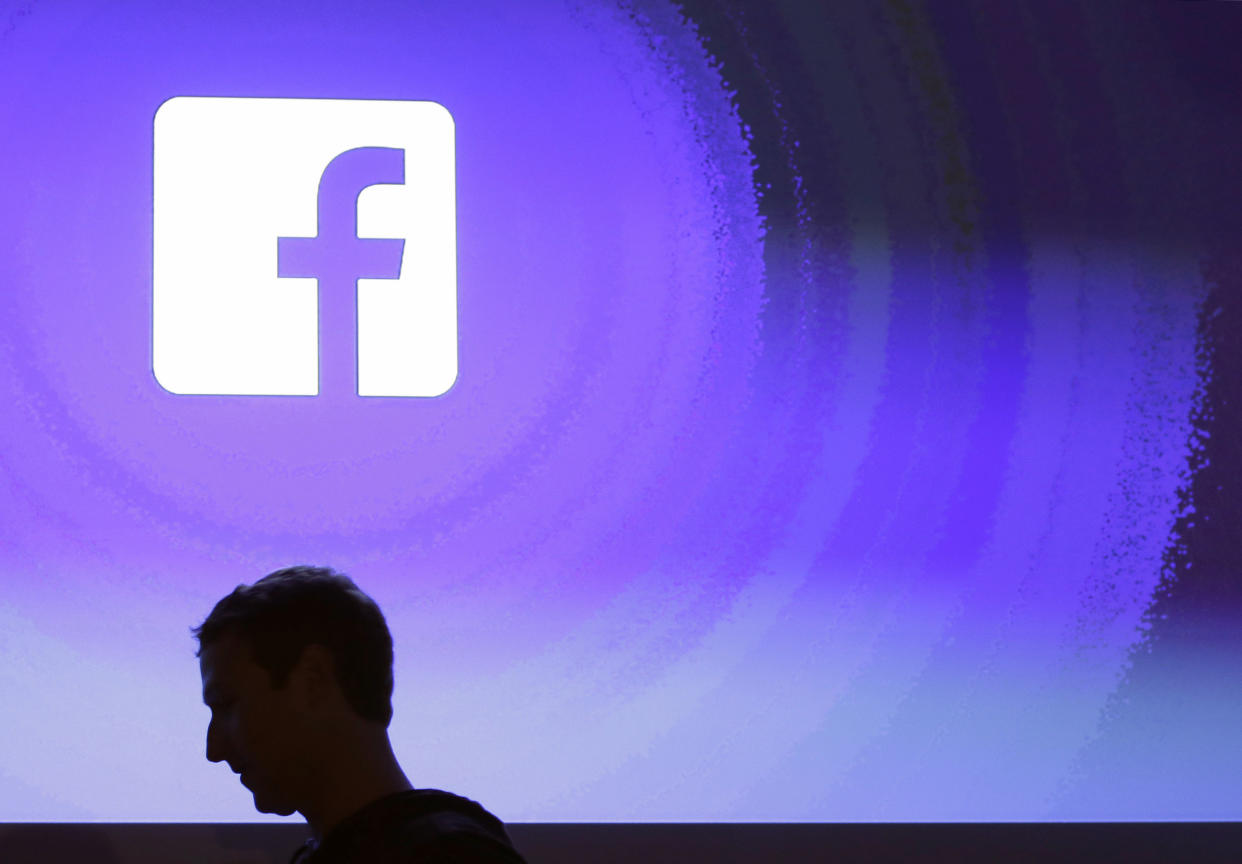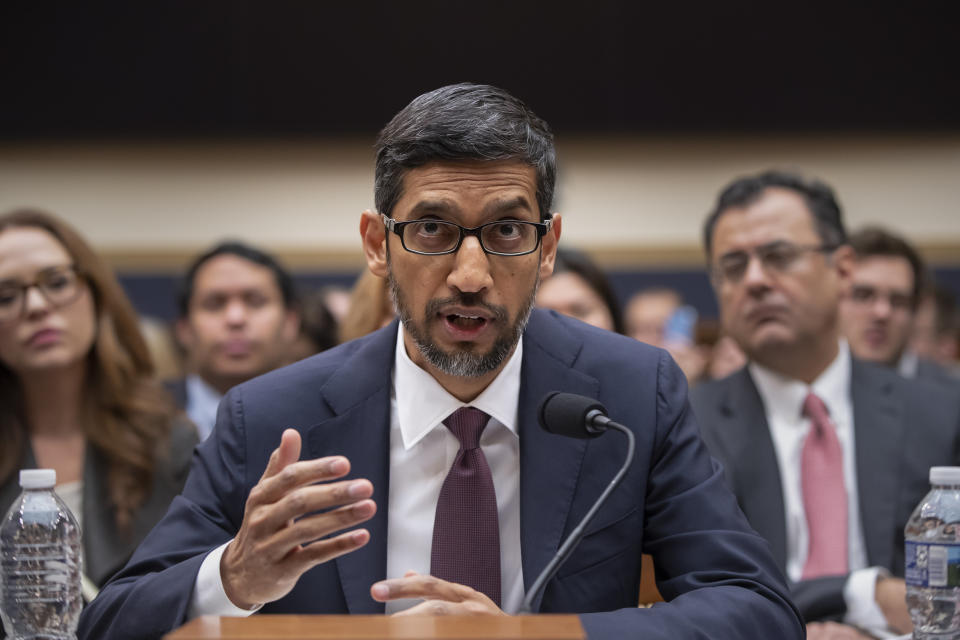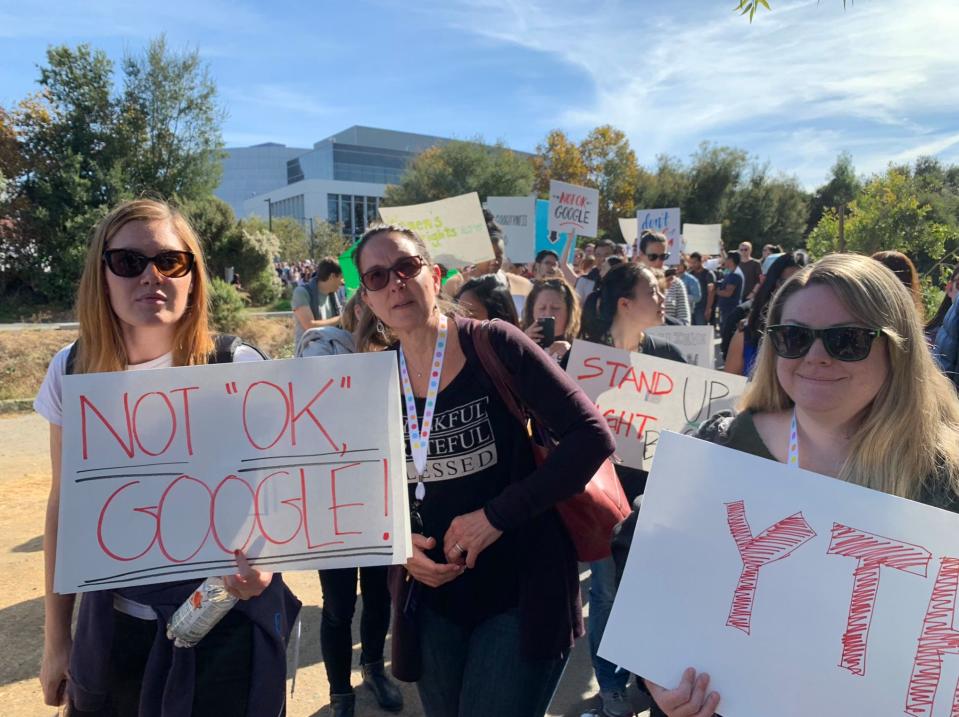How America's tech giants can regain our trust in 2019

For the tech industry, 2019 can't get here soon enough.
2018 proved to be a year of reckoning for Big Tech, rife with vast data leaks, mediocre management decisions, problematic work cultures and one company’s pageant-like search for a second headquarters (we’re looking at you, Amazon) that collectively chipped away at consumer trust in the industry. It’s no wonder 72% of respondents to a Pew Research Center survey published in June said tech companies can be trusted to do the right thing “only some of the time” or “hardly ever.”
“2018 was the year that everything kind of came to a head, and in 2019, we're going to start to see, number one, just how complex it is to do an ethics reset and to kind of really take a deep, hard look at the business and the ways in which it may have implications that are unintended,”says Susan Etlinger, an analyst with the San Francisco-based Altimeter Group.
That leaves one huge question for the most influential tech companies in the world: How can they regain the public’s broken trust and rebuild relationships with disillusioned users?
It won't be easy. These tech heavyweights will need to be far more transparent about how they use our data and why they need it. They’ll also need to affirm their commitment to providing more diverse, inclusive workplaces and hold their leaders accountable when they fail to protect users and employees.
Inform consumers how their data is being used

If this year illustrated anything for the average connected consumer, it’s that tech firms collect an incredible amount of data from their users: names, hometowns, interests, even recent online searches, among other bits and bytes.
But opaque terms of service make it difficult for consumers to comprehend just how much information they're forking over and the applications of that data. Couple that with constant reports of hacks, and it's easy to see why 75% of Pew Survey respondents don't think tech companies are doing enough to protect their data.
“Gone are the days of the 30-page terms and conditions,” says Penny Wilson, chief marketing officer of the social media management platform Hootsuite. “There's got to be an easy way of communicating with a consumer about what information you're using.”
The tech industry needs to lay out exactly what data it collects, how it collects it and which outside parties that data is shared with.
Part of the problem: Many users don't realize companies like Facebook and Google rely primarily on advertising to make money. Case in point, during Facebook CEO Mark Zuckerberg’s testimony on Capitol Hill in April, Senator Orrin Hatch (R-Utah) asked Zuckerberg how he is able to keep Facebook free to use.
To which Zuckerberg famously replied, “Senator, we run ads.”
The truth is, in 2018, advertising accounted for nearly 97% and 86% of Facebook and Google’s third-quarter revenues, respectively.
Some consumers may also be unaware how much companies track their web-surfing activities for advertising purposes, which in turn can be used by advertisers to target specific audiences.
"I think there is no transparency here, because I think the average person, and I think even people in technology, have no idea how much data these big businesses have or is available on you as a consumer," says Gartner research director Julian Poulter.
In addition to offering consumers clear and concise explanations of the data they collect, tech companies could regain the public’s trust by telling users which outside parties also have access to that information.
Facebook’s series of scandals this year proved to be an especially harsh lesson in data privacy.
The Cambridge Analytica news in March kicked up a firestorm, because the voter profiling firm managed to access up to 87 million users’ data without their knowledge and consent. And last week, The New York Times published a shocking report about how Facebook shared information with other tech giants including Amazon, Microsoft, Spotify, and Yahoo Finance's parent company Yahoo. Facebook has since said that any information was shared via partner agreements that users agreed to, and enabled features like sending Facebook messages within third-party apps, or integrating Facebook Timelines into specific device makers’ interfaces.
Corporate leadership should be held accountable when companies fail users

Providing users with a better understanding of how their data is used is a good start, but tech companies can also improve their image by holding their leaders and themselves accountable when they fail consumers. Consumer protection legislation could provide some accountability, as could forcing executives to resign after major missteps.
Currently, though, the U.S. doesn't have any form of comprehensive data protection legislation on the books. But that may soon change, as more lawmakers, and even tech companies themselves, call for some kind of federal data privacy law.
The most obvious model to reference when crafting such legislation, the European Union's General Data Protection Regulation (GDPR), stipulates that technology companies lay out their terms and conditions in easy to understand terms and severely penalizes those that don’t comply.
In July, California passed its own data privacy legislation that would allow consumers to see the information tech companies collect on them, request that it be deleted, and keep it from being sold to third-party services. Failure to meet those rules when the law goes into effect in 2020 could result in a $7,500 fine for each individual violation.
Tech companies, however, object to the new law, calling it onerous.
When members of Congress questioned tech leaders, including Zuckerberg, Facebook COO Sheryl Sandberg, Twitter CEO Jack Dorsey and (eventually) Google CEO Sundar Pichai over user privacy, the executives said they would still support some form of federal privacy legislation. The reason executives objected to the California rule, but still support a federal law is because a patchwork of state-by-state regulations would become too difficult to manage.
And while there’s been talk that a draft bill for federal privacy legislation may come sometime in early 2019, there’s no assurance such a law will be passed by this time next year.
Still, some argue that CEOs and other tech company leaders who can't keep user data safe shouldn't be let off the hook so easily. One way to hold them accountable, at least in extreme cases? Make them resign.
Scott Galloway, a professor of marketing at NYU Stern School of Business and author of the book, “The Four: The Hidden DNA of Amazon, Apple, Facebook, and Google,” believes that’s what Zuckerberg and Sandberg need to do if Facebook is going to win back disenchanted users who have jumped on the #DeleteFacebook bandwagon.
"Carlos Ghosn, the CEO of Nissan, is in a Tokyo prison for alleged expense impropriety,” Galloway pointed out. “The CEO of J.Crew has a disagreement with his board and is ousted. And yet, we have two individuals who arguably have demonstrated some of the most disingenuous—even reckless—behavior in the history of corporate America, and the media keeps asking questions like what can they do to restore confidence. So, I think the navel-gazing is a little superfluous. They need to be fired.”
Tech companies should make meaningful strides around diversity

Diversity is another area in which the tech industry falls short. Despite the industry’s reputation for innovation, Silicon Valley isn’t immune to bias and discrimination. Look no further than this year’s diversity data—and a series of high-profile scandals at Google and Facebook—for proof.
Google almost single-handedly revived the conversation around sexual harassment in tech after The New York Times reported in October that the Mountain View, California-based tech giant paid former Google exec and Android creator Andy Rubin $90 million to resign following sexual harassment accusations from a former girlfriend and Google employee. (Thousands of Google employees walked out of the company’s offices in early November, as a result.)
Google eventually relented to the pressure and did away with forced arbitration for sexual harassment and discrimination complaints, a key issue the protesters were pushing for. The company also pledged to provide regular, comprehensive lists of harassment claims and if they resulted in an employee being fired. Those same protections, however, don’t extend to Google’s contractors, which make up a sizable chunk of the company’s workforce.
A month after the Google scandal, Facebook raised issues around racial bias and discrimination when former Facebook manager Mark Luckie published a Facebook post, which was temporarily removed and reinstated by the social network without explanation. In the post, Luckie denounced Facebook’s work culture, as well as the social network as a communications tool for the black community.
“One of the things that we have to think about as we move into a world that is more and more governed by algorithms, is that if we're going to build systems to interact with people, if we're going to have digital interactions comprise a major part of our daily lives—even if we're just going to be humane and build companies that reflect reality—you know, we need to have diverse employees,” says Etlinger. “We need to have diverse management teams and diverse boards, and there just isn't any excuse about that anymore.”
Tech companies must make their workplaces and products safer for all of its employees and users. It’s not enough for them to plaster Black History Month fliers around the offices, deploy their own versions of the NFL’s Rooney Rule—as Facebook and Pinterest already do—which requires hiring managers to consider minority candidates for open positions, or even offer courses on managing unconscious bias. Companies should provide solutions that address the root causes of racial bias and discrimination by fundamentally changing people’s views on race, ethnicity and gender.
That said, Gina Bianchini, CEO and founder of Mighty Networks, points out that it took women over 70 years to finally gain the right to vote in the U.S.—a movement that took so long, some members of the women’s suffrage movement died before they could see their work come to fruition.
“Changing patriarchy is not going to happen in a year,” Bianchini explains. “Anybody who thinks that we’re going to make a ton of progress very quickly: they’re sadly mistaken, and that’s OK.”
Tech giants should be mindful as they expand geographically

While Facebook and Google were taking flack for their own failings, Amazon ran headlong into its own public relations nightmare with its long-hyped search for a second corporate headquarters.
What could have been just another search for more commercial office space became a 14-month-long pageant-like search. Candidate cities pulled out all the stops with zany gifts or generous financial incentives: the city of Stonecrest, Georgia, offered to build a new city called “Amazon” where Bezos could preside as mayor “for life,” while New Jersey and the city of Newark offered up to $7 billion in state and city tax incentives.
The overwrought search finally ended when Amazon announced it would split HQ2 into two large regional offices based in Queens, New York and Arlington, Virginia with a smaller campus in Nashville, Tennessee. The company also reportedly received more than $2 billion in tax incentives for its decision to build in those areas.
The HQ2 search left something of a bad aftertaste. With third-quarter 2018 revenues of $56.6 billion—up 26% year-over-year—and a market cap of nearly $712 billion, Amazon wasn’t hurting for cash. So encouraging cities to compete in a “Hunger Games”-style competition, in part to maximize state and tax incentives for Amazon’s gain, seemed tasteless and unnecessary.
“The notion that there were more than 10 cities that even had the viable infrastructure and the workforces to finance and support [HQ2] didn’t make any sense for the tertiary cities,” says Dave Hendricks, CEO and founder of Vertalo, a stakeholder registry and compliance platform for regulated security token offerings, who followed Amazon’s HQ2 search with interest.
It’s no secret that as tech companies expand, they’re beginning to look outside of pricey Silicon Valley to less cost-prohibitive areas around the U.S. including Portland, Oregon; Austin, Texas and even some less obvious choices that include Detroit, Michigan and Orlando, Florida.
However, moving forward, tech companies could be more mindful of how they expand their geographical footprint, as well as their interactions with local officials and residents. It’s not only more responsible thing to do—it’s a better look for the company, in general, according to some experts.
Translation? Don’t get too greedy.
That's a lesson that can be applied to Big Tech overall. For an industry with its vast size, swagger, and influence, tech companies should worry as much about protecting their employees and consumers as they worry about boosting revenues if they want consumers to trust them again. As they learned this year, one directly affects the other. And when companies inevitably make mistakes, PR-spun excuses simply won’t cut it.
If today’s Silicon Valley giants are to win back the trust of their users—and remain thriving businesses in the long-term—they'll have to try harder in 2019 and beyond.

